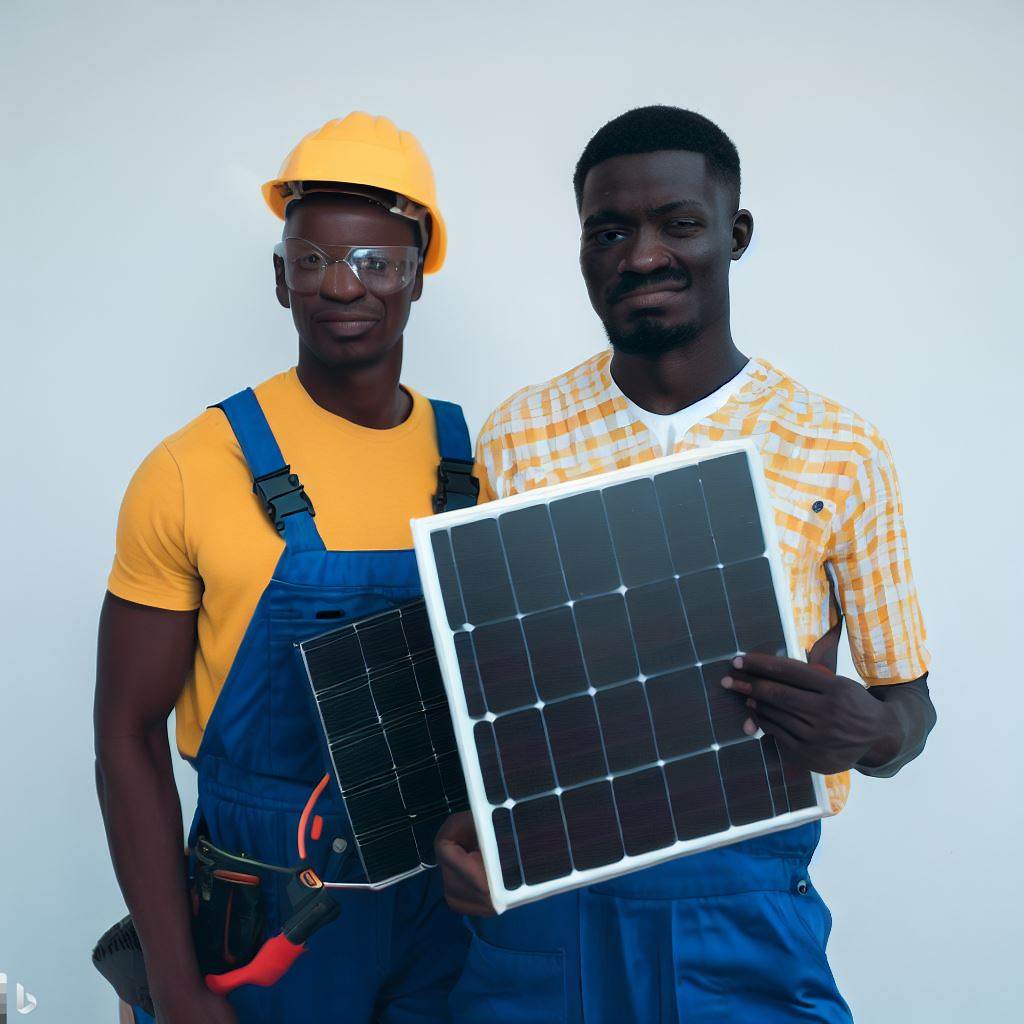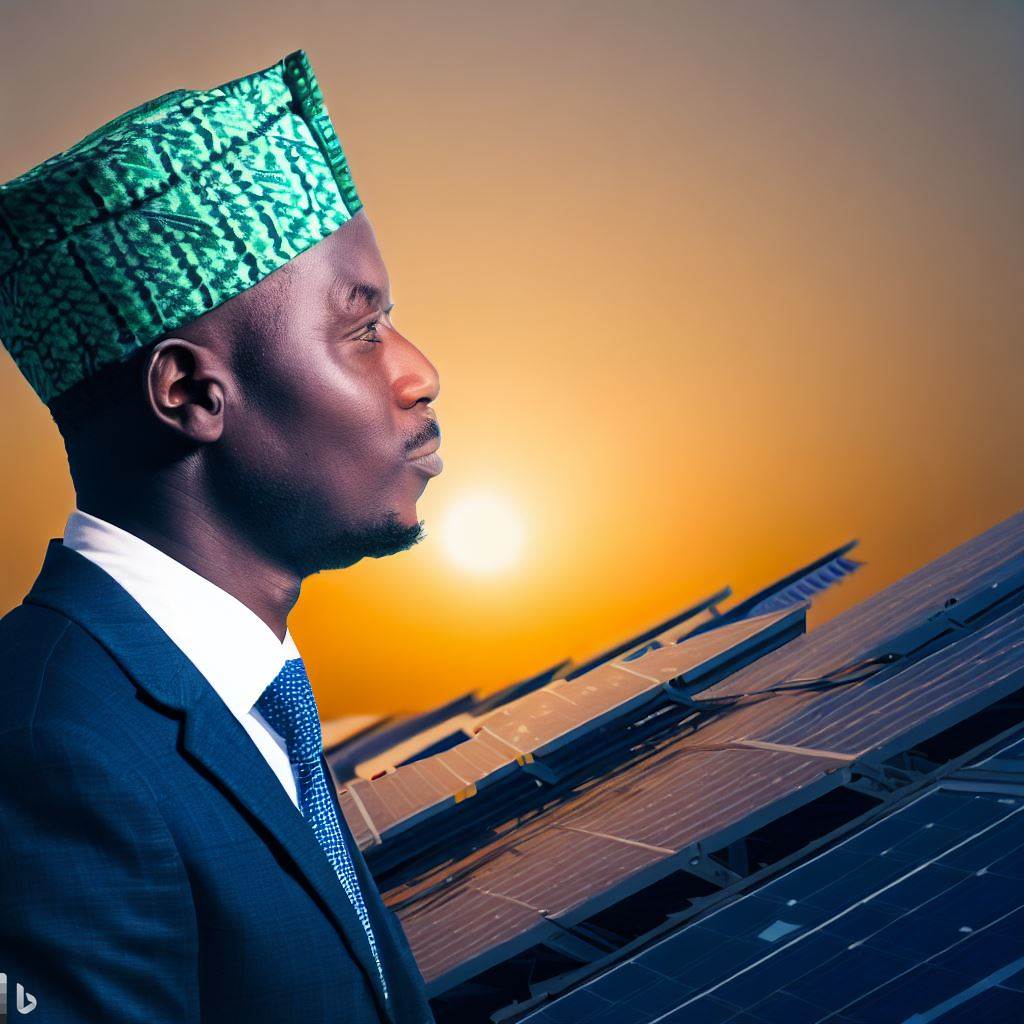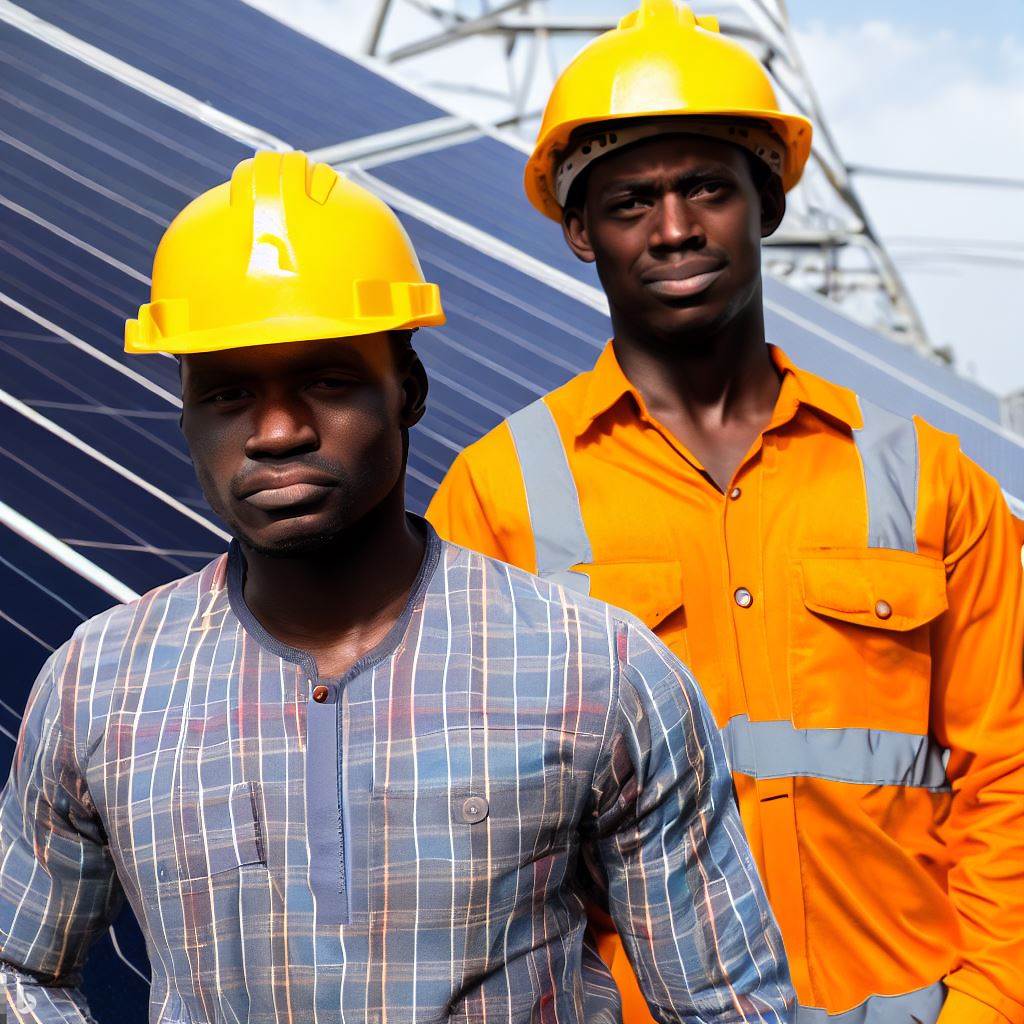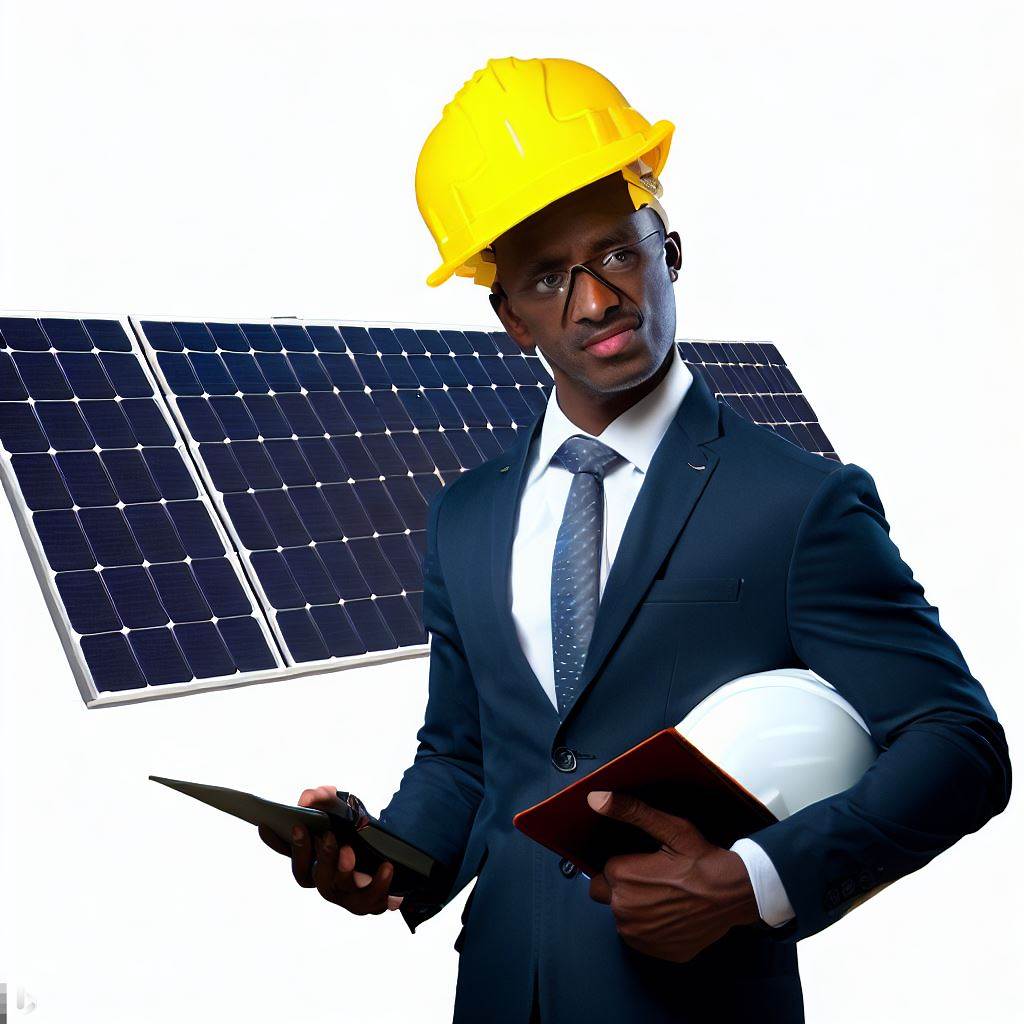Introduction
Let’s talk about solar PV installer skills.
Solar energy is playing an increasingly important role in Nigeria’s quest for sustainable and clean power sources.
As the country faces frequent power outages and struggles with unreliable electricity supply, solar energy offers a viable solution.
This renewable energy source is abundant in Nigeria, making it an ideal choice for generating electricity.
Explanation of the importance of solar energy in Nigeria
Solar energy is crucial for Nigeria’s development as it can help meet the nation’s growing energy demands.
With solar power, households, businesses, and industries can have access to a reliable and sustainable energy source.
Additionally, solar energy can contribute to reducing greenhouse gas emissions, mitigating climate change, and promoting a healthier environment.
Brief overview of the role of Solar PV Installers in the country
Solar PV Installers play a vital role in Nigeria’s solar energy sector. These skilled professionals are responsible for installing, maintaining, and repairing photovoltaic (PV) systems that convert sunlight into electricity.
They ensure the proper functioning of solar panels, inverters, and other electrical components.
Solar PV Installers need to have a good understanding of electrical systems, knowledge of solar technology, and the ability to troubleshoot and problem-solve.
With the increasing demand for solar energy in Nigeria, the need for well-trained Solar PV Installers is paramount.
These skilled individuals can contribute to the country’s energy revolution by installing solar systems efficiently and effectively.
They play a crucial role in establishing a reliable and sustainable energy infrastructure, benefiting both the economy and the environment.
In fact, solar energy is of immense importance to Nigeria, offering a reliable and sustainable power source. Solar PV Installers play a critical role in harnessing this energy by installing and maintaining solar systems.
As the country embraces solar energy, investing in the skills needed for Solar PV Installers becomes crucial for a successful transition to clean and renewable energy.
Skills Required for Solar PV Installers
Technical Knowledge
- An understanding of electrical knowledge is crucial for solar PV installers.
- They should possess knowledge about solar panel systems and how they function.
- Staying updated with the latest regulations and technologies in the field is essential.
Problem-solving Abilities
- Solar PV installers must have the ability to deal with challenges that may arise during installations.
- They may encounter limited space or complex wiring situations, requiring creative solutions.
- Being able to think critically allows them to troubleshoot issues and ensure optimal system performance.
Communication and Customer Service Skills
Solar PV installers interact with clients to:
- Explain installation, maintenance, and troubleshooting processes.
- Build rapport and address concerns, ensuring customer satisfaction.
Key skills for Nigerian solar PV installers:
- Technical knowledge: Understanding electrical systems and solar panel functionality is essential for efficient installations.
- Staying updated with industry regulations and technologies.
- Problem-solving: Overcoming installation challenges and ensuring optimal system performance.
- Communication: Clear explanations of processes, maintenance, and troubleshooting.
- Customer service: Building positive relationships, addressing concerns, and enhancing customer satisfaction.
In short, Nigerian solar PV installers require technical expertise, problem-solving skills, and excellent communication and customer service abilities for successful installations in a rapidly evolving industry.
Read: Understanding the Event Manager Role in Nigeria
Qualifications and Training
- Accredited Certification: Obtaining a recognized certification is crucial for solar PV installers in Nigeria.
- Importance of formal training and certification programs: These programs ensure comprehensive knowledge and expertise in solar PV installation.
- Recognized institutions and organizations offering solar PV installation courses in Nigeria: Examples include REA and NAPTIN.
On-the-Job Experience
- Gaining practical experience through apprenticeships or internships: Hands-on training enhances skills and familiarity with PV systems.
- The benefits of hands-on training in real-world installations: Trainees learn to troubleshoot, deal with challenges, and improve efficiency.
Qualifications and Training: Becoming a Competent Solar PV Installer in Nigeria
Solar energy is rapidly gaining prominence in Nigeria as the country seeks to diversify its energy sources and reduce reliance on fossil fuels.
Solar photovoltaic (PV) installations play a vital role in harnessing this renewable energy, and the demand for skilled solar PV installers is growing.
To excel in this field, individuals need to acquire the necessary qualifications and training.
Accredited Certification
One of the first steps towards becoming a professional solar PV installer is obtaining an accredited certification.
This certification serves as evidence of the individual’s knowledge and competence in solar PV installation.
It assures employers and clients that the installer has received proper training and possesses the necessary skills to perform the job effectively.
Formal training and certification programs are crucial in equipping installers with the comprehensive knowledge required to handle PV installations.
These programs cover various aspects such as system design, installation techniques, troubleshooting, and safety protocols.
By completing such programs, installers gain in-depth knowledge about PV systems and the best practices for their installation.
Recognized institutions and organizations in Nigeria offer courses specifically designed to train individuals in solar PV installation.
These courses are developed by industry experts and cover both theoretical and practical aspects to ensure a well-rounded understanding of the subject matter.
The Rural Electrification Agency (REA) and the National Power Training Institute of Nigeria (NAPTIN) are examples of institutions offering accredited training programs.
On-the-Job Experience
While formal training provides a strong foundation, gaining practical experience is equally important to become a competent solar PV installer.
On-the-job experience can be acquired through apprenticeships or internships with established solar installation companies.
These opportunities allow individuals to work under the guidance of experienced professionals and participate in real-world installations.
Hands-on training provides invaluable exposure to different types of PV systems, equipment, and installation techniques.
Installers learn how to handle challenges that may arise during installations, troubleshoot system issues, and ensure optimal performance.
This practical experience enhances their skills and prepares them for diverse installation scenarios and customer requirements.
In review, to thrive as a solar PV installer in Nigeria, an individual must possess the necessary qualifications and training.
Acquiring accredited certifications from recognized institutions is essential to demonstrate competence and expertise.
Additionally, gaining practical experience through apprenticeships or internships enhances an installer’s skills and allows them to apply theoretical knowledge in real-world situations.
With the right qualifications and on-the-job experience, solar PV installers can contribute to the growth of renewable energy in Nigeria and meet the increasing demand for sustainable power sources.
Read: Solar PV Installer Certification in Nigeria

Gain More Insights: Tips for Passengers: A Nigerian Bus Driver’s Advice
Gain More Insights: Day in the Life: A Nigerian Coating Technician’s Routine
Soft Skills and Attributes
Physical Fitness
- The physically demanding nature of solar PV installations, including climbing ladders and working at heights.
- Importance of being in good physical condition for effective work performance.
Attention to Detail
- Precision and accuracy in installing equipment and wiring connections.
- Avoiding mistakes that may affect the overall system efficiency and safety.
Adaptability and Quick Learning
- Coping with new technologies, system upgrades, and evolving industry practices.
- Ability to quickly grasp and apply new knowledge to different installation scenarios.
Read: Solar PV Installer Careers in Nigeria: Get Started
Uncover the Details: The Impact of Curators on Nigeria’s Cultural Heritage
Future of Solar PV Installation in Nigeria
The future of solar PV installation in Nigeria is promising due to:
- Growing Solar Energy Market: The country’s abundant sunshine makes it ideal for solar energy harnessing.
- Government Initiatives: Incentives and policies promote renewable energy adoption.
- High Demand for Installers: Efficient setup and maintenance are essential for solar PV systems.
- Job Opportunities: Both residential and commercial sectors seek solar installations, creating employment.
- Career Growth: Specialization in design, project management, and quality control leads to higher positions and earnings.
To excel, continuous professional development is vital:
- Stay Updated: Keep abreast of evolving technology and industry trends through workshops and seminars.
- Certifications: Accreditation enhances credibility and employability.
- Technical Knowledge: Understand panel efficiency, battery storage, and smart grid integration for optimal solutions.
In essence, Nigeria’s solar PV installation sector holds significant potential for job opportunities and career advancement, with continuous learning being key to success.
Read: Local Ingredients Chefs Love in Nigerian Cooking
Conclusion
Becoming a Solar PV Installer in Nigeria requires a specific set of skills.
These skills include technical knowledge of solar energy systems, electrical expertise, problem-solving abilities, and effective communication skills.
Additionally, physical fitness and a commitment to safety are also important. By possessing these skills, individuals can excel in this field and contribute to the country’s renewable energy sector.
Recap of the key skills required for Solar PV Installers in Nigeria
To summarize, Solar PV Installers in Nigeria need technical knowledge, electrical expertise, problem-solving abilities, communication skills, physical fitness, and a commitment to safety.
Encouragement for individuals interested in pursuing a career in solar energy installation
For those interested in a career in solar energy installation, this field offers promising opportunities for growth and job satisfaction.
With the rapid advancement of renewable energy technologies, there is a high demand for skilled professionals.
By acquiring the necessary skills and staying updated with the latest industry trends, individuals can thrive in this evolving sector.
Closing thoughts on the importance of renewable energy for the country’s sustainable development
Renewable energy plays a crucial role in Nigeria’s sustainable development.
By transitioning to clean and renewable sources, the country can reduce its dependency on fossil fuels, decrease greenhouse gas emissions, and mitigate climate change.
Furthermore, investing in renewable energy promotes economic growth, job creation, and energy security.
Embracing and promoting renewable energy is vital for Nigeria’s future and the well-being of its citizens.




